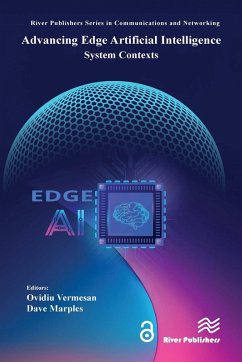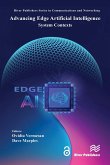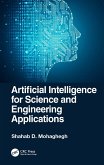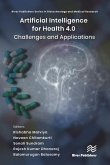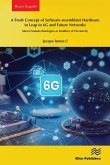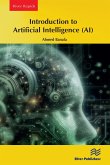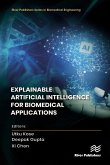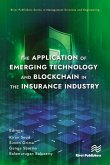0,99 €
0,99 €
inkl. MwSt.
Sofort per Download lieferbar

0 °P sammeln
0,99 €
Als Download kaufen

0,99 €
inkl. MwSt.
Sofort per Download lieferbar

0 °P sammeln
Jetzt verschenken
Alle Infos zum eBook verschenken
0,99 €
inkl. MwSt.
Sofort per Download lieferbar
Alle Infos zum eBook verschenken

0 °P sammeln
- Format: ePub
- Merkliste
- Auf die Merkliste
- Bewerten Bewerten
- Teilen
- Produkt teilen
- Produkterinnerung
- Produkterinnerung

Bitte loggen Sie sich zunächst in Ihr Kundenkonto ein oder registrieren Sie sich bei
bücher.de, um das eBook-Abo tolino select nutzen zu können.
Hier können Sie sich einloggen
Hier können Sie sich einloggen
Sie sind bereits eingeloggt. Klicken Sie auf 2. tolino select Abo, um fortzufahren.

Bitte loggen Sie sich zunächst in Ihr Kundenkonto ein oder registrieren Sie sich bei bücher.de, um das eBook-Abo tolino select nutzen zu können.
The book presents some key topics and early thinking from the EdgeAI project, covering data backhaul technologies, lifecycle management, mechanisms for developing AIs at the edge and techniques for interacting with those AIs.
- Geräte: eReader
- ohne Kopierschutz
- eBook Hilfe
- Größe: 9.75MB
Andere Kunden interessierten sich auch für
![Advancing Edge Artificial Intelligence (eBook, PDF) Advancing Edge Artificial Intelligence (eBook, PDF)]() Ovidiu VermesanAdvancing Edge Artificial Intelligence (eBook, PDF)0,99 €
Ovidiu VermesanAdvancing Edge Artificial Intelligence (eBook, PDF)0,99 €![Artificial Intelligence for Science and Engineering Applications (eBook, ePUB) Artificial Intelligence for Science and Engineering Applications (eBook, ePUB)]() Shahab D. MohagheghArtificial Intelligence for Science and Engineering Applications (eBook, ePUB)79,95 €
Shahab D. MohagheghArtificial Intelligence for Science and Engineering Applications (eBook, ePUB)79,95 €![Artificial Intelligence for Health 4.0: Challenges and Applications (eBook, ePUB) Artificial Intelligence for Health 4.0: Challenges and Applications (eBook, ePUB)]() Artificial Intelligence for Health 4.0: Challenges and Applications (eBook, ePUB)118,95 €
Artificial Intelligence for Health 4.0: Challenges and Applications (eBook, ePUB)118,95 €![A Fresh Concept of Software-resemblant Hardware to Leap to 6G and Future Networks (eBook, ePUB) A Fresh Concept of Software-resemblant Hardware to Leap to 6G and Future Networks (eBook, ePUB)]() Jacopo IannacciA Fresh Concept of Software-resemblant Hardware to Leap to 6G and Future Networks (eBook, ePUB)72,95 €
Jacopo IannacciA Fresh Concept of Software-resemblant Hardware to Leap to 6G and Future Networks (eBook, ePUB)72,95 €![Introduction to Artificial Intelligence (AI) (eBook, ePUB) Introduction to Artificial Intelligence (AI) (eBook, ePUB)]() Ahmed BanafaIntroduction to Artificial Intelligence (AI) (eBook, ePUB)44,95 €
Ahmed BanafaIntroduction to Artificial Intelligence (AI) (eBook, ePUB)44,95 €![Explainable Artificial Intelligence for Biomedical Applications (eBook, ePUB) Explainable Artificial Intelligence for Biomedical Applications (eBook, ePUB)]() Explainable Artificial Intelligence for Biomedical Applications (eBook, ePUB)118,95 €
Explainable Artificial Intelligence for Biomedical Applications (eBook, ePUB)118,95 €![The Application of Emerging Technology and Blockchain in the Insurance Industry (eBook, ePUB) The Application of Emerging Technology and Blockchain in the Insurance Industry (eBook, ePUB)]() The Application of Emerging Technology and Blockchain in the Insurance Industry (eBook, ePUB)108,95 €
The Application of Emerging Technology and Blockchain in the Insurance Industry (eBook, ePUB)108,95 €-
-
-
The book presents some key topics and early thinking from the EdgeAI project, covering data backhaul technologies, lifecycle management, mechanisms for developing AIs at the edge and techniques for interacting with those AIs.
Dieser Download kann aus rechtlichen Gründen nur mit Rechnungsadresse in A, B, BG, CY, CZ, D, DK, EW, E, FIN, F, GR, HR, H, IRL, I, LT, L, LR, M, NL, PL, P, R, S, SLO, SK ausgeliefert werden.
Produktdetails
- Produktdetails
- Verlag: Taylor & Francis
- Seitenzahl: 256
- Erscheinungstermin: 4. März 2024
- Englisch
- ISBN-13: 9781040027073
- Artikelnr.: 69953570
- Verlag: Taylor & Francis
- Seitenzahl: 256
- Erscheinungstermin: 4. März 2024
- Englisch
- ISBN-13: 9781040027073
- Artikelnr.: 69953570
- Herstellerkennzeichnung Die Herstellerinformationen sind derzeit nicht verfügbar.
Dr. Ovidiu Vermesan holds a Ph.D. degree in microelectronics and a Master of International Business (MIB) degree. He is Chief Scientist at SINTEF Digital, Oslo, Norway. His research interests are intelligent systems integration, mixed-signal embedded electronics, analogue neural networks, edge artificial intelligence and cognitive communication systems. Dr. Vermesan received SINTEF's 2003 award for research excellence for his work on implementing a biometric sensor system. He is currently working on projects addressing nanoelectronics, integrated sensor/actuator systems, communication, cyber-physical systems (CPSs) and the Industrial Internet of Things (IIoT), with applications in green mobility, energy, autonomous systems, and smart cities. He has authored or co-authored over 100 technical articles and conference papers. He is actively involved in the activities of the European partnership for Key Digital Technologies (KDT) Joint Undertaking (JU), now the Chips JU. He has coordinated and managed various national, EU and other international projects related to smart sensor systems, integrated electronics, electromobility and intelligent autonomous systems such as E3Car, POLLUX, CASTOR, IoE, MIRANDELA, IoF2020, AUTOPILOT, AutoDrive, ArchitectECA2030, AI4DI and AI4CSM. Dr. Vermesan actively participates in national, Horizon Europe and other international initiatives by coordinating and managing various projects. He is a member of the Alliance for IoT and Edge Computing Innovation (AIOTI) board. He is currently the coordinator of the Edge AI Technologies for Optimised Performance Embedded Processing (EdgeAI) project.
Dr. Dave Marples is Chief Scientist at Technolution in Gouda, NL where he is responsible for research and early-stage technical activities for the company. His primary research interests are in networked embedded systems in a systems engineering context. He regularly participates in EU Horizon and AENEAS research activities and is a member of the XECS Technical Experts Group. He is a member of the steering board of the IEEE Consumer Communications and Networking Conference (CCNC) and is a Fellow of the OSGi for services rendered as architecture chair and executive director. He contributes to open-source projects and is the founder of orbcode.org. He was previously CS of the Internet Architecture Research laboratory at Telcordia (previously Bellcore) in Morristown, NJ where, amongst other things, he was responsible for the Networked Appliances research program. He was co-founder of the IEEE Communications Magazine Special Topic on Networked Appliances which runs today as the Internet of Things special topic. His Ph.D. in Communications Systems is from Strathclyde University, Scotland and his B.Eng. and M.Eng. degrees in Electronics, Communication and Computer Engineering are from Bradford University, England. He is an Industrial Fellow of the Royal Society for the Exhibition of 1851 and lives in the UK with his partner, son and daughter. His hobbies include anything with an engine and clay pigeon missing.
Dr. Dave Marples is Chief Scientist at Technolution in Gouda, NL where he is responsible for research and early-stage technical activities for the company. His primary research interests are in networked embedded systems in a systems engineering context. He regularly participates in EU Horizon and AENEAS research activities and is a member of the XECS Technical Experts Group. He is a member of the steering board of the IEEE Consumer Communications and Networking Conference (CCNC) and is a Fellow of the OSGi for services rendered as architecture chair and executive director. He contributes to open-source projects and is the founder of orbcode.org. He was previously CS of the Internet Architecture Research laboratory at Telcordia (previously Bellcore) in Morristown, NJ where, amongst other things, he was responsible for the Networked Appliances research program. He was co-founder of the IEEE Communications Magazine Special Topic on Networked Appliances which runs today as the Internet of Things special topic. His Ph.D. in Communications Systems is from Strathclyde University, Scotland and his B.Eng. and M.Eng. degrees in Electronics, Communication and Computer Engineering are from Bradford University, England. He is an Industrial Fellow of the Royal Society for the Exhibition of 1851 and lives in the UK with his partner, son and daughter. His hobbies include anything with an engine and clay pigeon missing.
1. Edge AI LoRa Mesh Technologies 2. Edge AI Lifecycle Management 3.
Federated Learning: Privacy, Security and Hardware Perspectives 4. Inside
the AI Accelerators: From High Performance to Energy Efficiency 5.
Designing Lightweight CNN for Images: Architectural Components and
Techniques 6. Natural Language Conditioned Planning of Complex Robotics
Tasks 7. An Overview of the Automated Optical Inspection Edge AI Inference
System Solutions 8. Efficient AI-based Attack Detection Methods for
Sensitive Edge Devices and Systems 9. Explainability and Interpretability
Concepts for Edge AI Systems
Federated Learning: Privacy, Security and Hardware Perspectives 4. Inside
the AI Accelerators: From High Performance to Energy Efficiency 5.
Designing Lightweight CNN for Images: Architectural Components and
Techniques 6. Natural Language Conditioned Planning of Complex Robotics
Tasks 7. An Overview of the Automated Optical Inspection Edge AI Inference
System Solutions 8. Efficient AI-based Attack Detection Methods for
Sensitive Edge Devices and Systems 9. Explainability and Interpretability
Concepts for Edge AI Systems
1. Edge AI LoRa Mesh Technologies 2. Edge AI Lifecycle Management 3.
Federated Learning: Privacy, Security and Hardware Perspectives 4. Inside
the AI Accelerators: From High Performance to Energy Efficiency 5.
Designing Lightweight CNN for Images: Architectural Components and
Techniques 6. Natural Language Conditioned Planning of Complex Robotics
Tasks 7. An Overview of the Automated Optical Inspection Edge AI Inference
System Solutions 8. Efficient AI-based Attack Detection Methods for
Sensitive Edge Devices and Systems 9. Explainability and Interpretability
Concepts for Edge AI Systems
Federated Learning: Privacy, Security and Hardware Perspectives 4. Inside
the AI Accelerators: From High Performance to Energy Efficiency 5.
Designing Lightweight CNN for Images: Architectural Components and
Techniques 6. Natural Language Conditioned Planning of Complex Robotics
Tasks 7. An Overview of the Automated Optical Inspection Edge AI Inference
System Solutions 8. Efficient AI-based Attack Detection Methods for
Sensitive Edge Devices and Systems 9. Explainability and Interpretability
Concepts for Edge AI Systems
